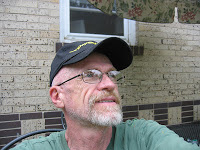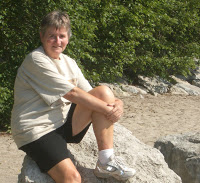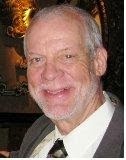I hardly know where to begin to
write about my one-and-only mother.
“Mother” is the last descriptor she would ever want to define
her function in life. If she could, she
would surely prefer to be remembered for her contributions to education,
journalism, or faith than maternalism.
If I had to choose, I would say she bore more resemblance to the Mary
Tyler Moore character in Ordinary People
than Barbara Billingsley in Leave It to
Beaver. That is to say, she had few of
the maternal instincts that we normally associate with Midwestern families of
the post-World War II era.
Like Lucille Ball and Desi Arnaz, my
parents slept in twin beds. My dad
dressed in a separate bedroom, which also served as his office. Although my bedroom was just across a narrow
hallway, I don’t remember ever hearing any sounds coming from their bedroom
that would suggest anything physical took place in that sterile space. I never saw them hug or kiss, not even a peck
on the cheek. My parents didn’t even
argue, at least, in my presence. My dad
was a solid breadwinner, meek and mild-mannered as Clark Kent. Together, they were the very model of the
modern, Middle American, Methodist couple–except for their fondness for a
highball before dinner.
Mother grew up in the small, rural,
southwest-Kansas town of Pratt. She was
proud of the fact that Alfred Hitchcock’s one-time-favored actress, Vera Miles,
attended school there. Her father, the
only grandparent I ever knew, was an engineer on the Rock Island railroad. They raised chickens and a few cows on their
small property on the edge of town.
There were six children, three girls and three boys. Mother was the oldest. As such, she had many responsibilities for
home-making and child-rearing. I suspect
that that had much to do with her distaste for such menial labor in her
adulthood. She had more dignified
aspirations.
Mother was quite intelligent. She graduated from high school at the age of
sixteen with her sights set on going to college. It was 1923, however, and her parents saw no
value in a daughter of theirs staying in school. She was on her own. She held a lifelong deep resentment over the
fact that her brothers, none of whom were in the least interested in further
matriculation, were given a car as their graduation present.
Denied any way of supporting herself
on her own, she soon married. By the
time she was 23, she had given birth to a son and a daughter. More and more, she was feeling trapped in a
hopeless and loveless situation. She
wanted a career. She was bright and
ambitious. Living with a man who she
felt was never going anywhere in life and being saddled with two small kids was
like being entombed alive. So, in 1936,
she filed for divorce. Almost
shockingly, she did not ask for custody of the children. In those times, it was almost automatic that
the children would be placed in the care of the mother. Not so this time. BJ and Joyce were placed with their paternal
aunt, also living in Pratt.
Before long, mom and another woman
had opened a beauty parlor above the Sears department store in Pratt. She took the two kids to the movies every
Wednesday evening. Sixty years later, as
Mom was brushing my daughter’s hair at our house in Michigan, she started
talking about the time she and the other woman ran a beauty parlor. My daughter, who is bisexual, later related
that she was getting the impression that there might have been more than
business on the two women’s minds.
Mother had told me some years before that her partner had, quite
abruptly, sold her interest in the shop to her and taken off for California,
never to be heard from again. A lover’s
quarrel or a simple commercial transaction?
I’ll never be certain.
The beauty shop was down the hall
from the office of the man who would become my father. They dated and were married in 1940. It would be 4-1/2 years before mom got
pregnant with me. Perhaps it was the
turmoil of WWII. My dad didn’t serve in
the war because of his limp from polio contracted when he was 20. Mixed blessing, I would say.
On the other hand, my suspicion is
that Mom was just not interested in having another child. By 1945, she was 38 years old. She was still hoping for a career as a writer
or secretary or something. My fantasy is
that on VE Day–May 7, 1945–my father swept my mom up in his arms and carried
her to the bedroom where they had their own private celebration of the
sweepingly historic occasion. I was born
on February 3rd of the following year. A
new era of American domination was dawning and I would be in on the ground
floor.
There were a few small hitches,
however. Mom made plain many years later
that I was the child my father wanted–his one and only. In addition, in her view, I was a
“deficit baby”, that is, a parasite that siphoned off the calcium
from her bones and teeth. At the baby
shower in my honor, they played a game where the guests attempt to estimate the
birth weight of the baby. All of the guesses,
duly preserved in my baby book, were on the low side, suggesting to me that Mom
may not have been taking enough nourishment.
My actual birth weight was over seven pounds, close to normal.
One of my earliest memories is Mom
singing a lullaby to me. The lyrics,
written by Paul Robeson, are, in part and adapted, as follows:
Evenin’
breezes sighin’, moon is in the sky.
Little man, it’s time for bed.
Mommy’s little hero is tired and wants to cry;
Now, come along and rest your weary head.
Little man, you’re cryin’, I know why you’re blue.
Someone took your kiddy-car away.
You better go to sleep now
Little man, you’ve had a busy day.
Johnny won your marbles, tell you what we’ll do,
Mom’ll get you new ones right away.
Sadly, that was a rare moment of
tranquility between Mom and me. Most of
my recollections of close contact with Mom involved physical pain on my
part. Not to paint myself as a complete
innocent, however. Some of you may
remember my story of many months ago about climbing the neighbor’s
chimney. Years later, there was the time
I walked home from school in a light rain without a jacket. Mom was standing in the front doorway. As I opened the door, she slapped my face,
hard.
“How dare you not wear a coat
in the rain. Do you want to get
sick?”
“I’m sorry. I wasn’t thinking”, I said in complete
contrition, hoping to appease her anger.
(After all, it had worked before when I suggested that mom stop worrying
and ask God to take care of me.) Still,
I was blind-sided by her action. Looking
back on it now, I believe that Mom resented being stuck at home as a lowly housewife
and my getting a cold would only aggravate her sense of obligation and
despondency.
When I had a spanking coming, it’s
delivery came at the hand of my mother.
Her hands were good for other things, as well. When I had ringworm of the scalp, it was she
who was stuck with the most unpleasant job of removing the hairs from a
circular patch of my scalp about two inches in diameter with a pair of
tweezers, one-by-one. About five minutes
at a time was all either she or I could stand.
When I got stabbed in the hand with a pencil at school, it fell upon Mom
to dig out the remnants of graphite with a needle.
I believe that Mom simply did not
have the disposition for being a caregiver.
I remember her telling me about having to care for my paternal grandmother,
who was dying of colon cancer in the early 1940’s. It was clear it was not something she found
rewarding.
But Mom’s hardness was shown in
other, perhaps even less endearing ways.
When I graduated from law school, my parents drove to Detroit from Hutchinson,
Kansas, for the ceremony in Ford Auditorium downtown. With about an hour to go before the
procession began, Mom announced that she wasn’t feeling well and wanted to stay
at our house. I was terribly
disappointed but not surprised. She had
been deprived of the opportunity to be a part of such an occasion in her own
right; how tough it must of been for her to look back on her life of nearly
three-quarters of a century as principally a home-maker and not feel big-time
self-pity.
Her predicament came most into focus
for me on her 50th birthday. I was
practicing my Hawaiian steel guitar–hats off to The Lawrence Welk Show–in the utility room across the tiny dining
room from the kitchen, where Mom was ironing.
All of a sudden, she burst into tears.
I had never witnessed such a scene in our emotionally sterile
household. Being gay–though closeted
even to myself–I wanted to rush over to her side to comfort her. But I had not the slightest idea what to say
to her. I had no clue what was going through
her head. Had Dad said something before
leaving for work? So, I just kept on
playing my syrupy music, which seemed to be of no help whatsoever. Fifty years old, ambitious, and still ironing
in the kitchen. That’s enough to depress
anybody. I myself don’t iron to this
day.
On my parents last visit to Michigan
in 1989, Mom was sitting in the new family room addition. At one point, she said, “I think I must
have left my cane upstairs”. We had
no upstairs.
After my Dad died in 1990, my entire
family–wife, two kids and I–went to Kansas to take care of Mom. It soon became apparent that Dad had been
covering for Mom for months. She was not
able to live by herself. We moved her to
a “progressive living” type of senior housing–independent living, assisted
living, and nursing care.
Initially, we thought independent
living would be the best choice, as she was still able to do quite a few things
for herself. Ten weeks later, we got a
call from the staff. Mom was having
hallucinations about someone being under her bed and was not regular about
showing up for meals. They suggested
moving her to the nursing section.
Within a week or two, we got another
call, one which caused my mind to harken back to my daughter’s story about my
Mom’s possible sexual orientation. My
mother had gotten out of bed and dragged her roommate from her bed onto the
floor. Then, Mom had sat astride the
other woman demanding sex, saying, “You are my husband and you owe
me!” The institution informed me
that they had to tie my mother into her bed with straps and that she would have
to be moved to a different facility as they were not equipped to handle such
behavior.
Not only was Mom suffering from the
side effects of medications that lower one’s inhibitions, but she also was apparently
afflicted with Alzheimer’s disease. It
was Christmas Season. I had to quickly
find her a place with an Alzheimer’s patient wing. The nearest decent one was in Wichita. We moved Mom there as soon as the
arrangements could be made.
At this point, I would have given
almost anything to have my old Mom back.
Her disease may have dulled the loneliness and frustration of losing all
track of time and familiarity of face and habitat but I can only imagine that those
last three years were nearly unbearable, both for her and the staff and other
inhabitants, for whom Mom had nary a kind word to say. It was during that period that my
half-brother–her son–died of lung disease at the age of 63. I never told her. How could I, when she kept saying that BJ was
coming to pick her up for a drive? At
the end, she no longer recognized me.
She died surrounded by strangers, pushing a walker down the hallway,
saying antagonistic things to those she passed.
Was she ever truly happy? Did I
ever make her smile? Either I don’t know
or I can’t remember or both. I do know
that I made my Dad smile and I guess that will have to do.
©
2 December 2013
About the Author
I came to the beautiful state of
Colorado out of my native Kansas by way of Michigan, the state where I married
and I came to the beautiful state of Colorado out of my native Kansas by way of
Michigan, the state where I married and had two children while working as an
engineer for the Ford Motor Company. I was married to a wonderful woman for 26
happy years and suddenly realized that life was passing me by. I figured that I
should make a change, as our offspring were basically on their own and I wasn’t
getting any younger. Luckily, a very attractive and personable man just
happened to be crossing my path at that time, so the change-over was both
fortuitous and smooth.
Soon after, I retired and we
moved to Denver, my husband’s home town. He passed away after 13 blissful years
together in October of 2012. I am left to find a new path to fulfillment. One
possibility is through writing. Thank goodness, the SAGE Creative Writing Group
was there to light the way.


